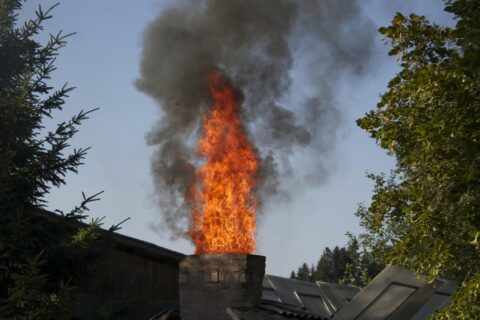How to Avoid Animals That Get Trapped in Your Chimney
No matter how benevolent or big-hearted you are, and no matter how open your home is to any of your friends or family members, there are certain guests you don’t want taking up residence in any part of your house — namely, wild animals. Unfortunately, your home makes an enticing place for animals that are looking to escape the elements, such as heavy rain, or trying to hide from predators. In the winter, when the temperatures drop, your home provides a place to get warm.
And in some situations, your chimney is an open access point where animals can get in. They might make themselves at home by building a den or a nest; in other situations, they might simply enter and get trapped. This sort of unwanted visit could happen with birds, rodents, squirrels, bats, or even larger animals like raccoons.
If the thought of any of those animals infiltrating your home makes you a little uneasy, you’re not wrong to feel that way — animals could bring parasites with them that ultimately leave their host and then make their way onto you or onto a pet; they could bring other diseases as well; or the animal could ultimately find their way into your home, causing harm to you or your property. You should also be concerned about their nest taking up space in your chimney. This can block the flow of air from your fireplace, which could cause a backup of dangerous carbon monoxide in your home. This puts you and your family at risk of carbon monoxide poisoning. If you build a fire, and the nest catches flame, you could suffer a serious fire hazard.
What should I do if I have an animal in my chimney?
If you suspect (or know) you have an animal in your chimney, take action immediately. Here’s what you should do:
- Call your local animal control and explain the situation. Provide as much detail as you can so they can properly prioritize your case. Animal control will send someone to come remove the animal and can provide any instruction specific to your situation. Do not attempt to make contact with the animal yourself — you do not know how the animal will respond to you, and this could result in your getting sick or injured.
- If the animal is trapped and you are able to safely keep a reasonable distance from the animal, you can attempt to help it escape your chimney by lowering a rope down. A squirrel, for example, will be able to climb up the rope and return to its life in the wild. In some situations, you might be able to lure an animal out of your chimney by putting bird seeds or other bait at the top of the chimney. Be sure to remove any bait once the animal is successfully lured out, as you do not want to lure any animals back afterward.
- If you are waiting for animal control or another professional to arrive, make sure you cover your fireplace with either your glass doors or metal grate, which will prevent the animal from coming down the chimney and getting into your home. If you do not have sufficient covering to close your fireplace, you can consider using tarp and heavy-duty tape.
- Do not ever try to smoke an animal out by building a fire. This is inhumane. If the animal is truly trapped, or does not understand what’s happening, it can die from smoke inhalation — then you have gone from a live animal in your chimney to a dead animal in your chimney (or potentially a nest full of dead animals in your chimney).
How can I keep animals from going in my chimney?
If you don’t currently have an animal trapped in your chimney, you should still take proactive steps to avoid the problem happening in the future. Here’s how:
- Installing a chimney cap is the best measure you can take. These cage-like structures have mesh screenings on all sides that will allow smoke and ash to escape your chimney, but they will keep animals out. Note that they are not effective for keeping out insects, like bees and hornets. It’s also important to keep in mind that chimney caps with larger holes in the mesh may not keep out certain rodents — don’t forget that rats and mice can squeeze themselves through very small holes. If a pencil can fit through, so can a mouse.
- If you want more protection in addition to a chimney cap, you can install an ultrasonic device that will radiate noise you can’t hear but animals can (and will want to stay away from). While ultrasonic devices can be good for keeping animals away, they will not protect your chimney from the elements the way a chimney cap can.


